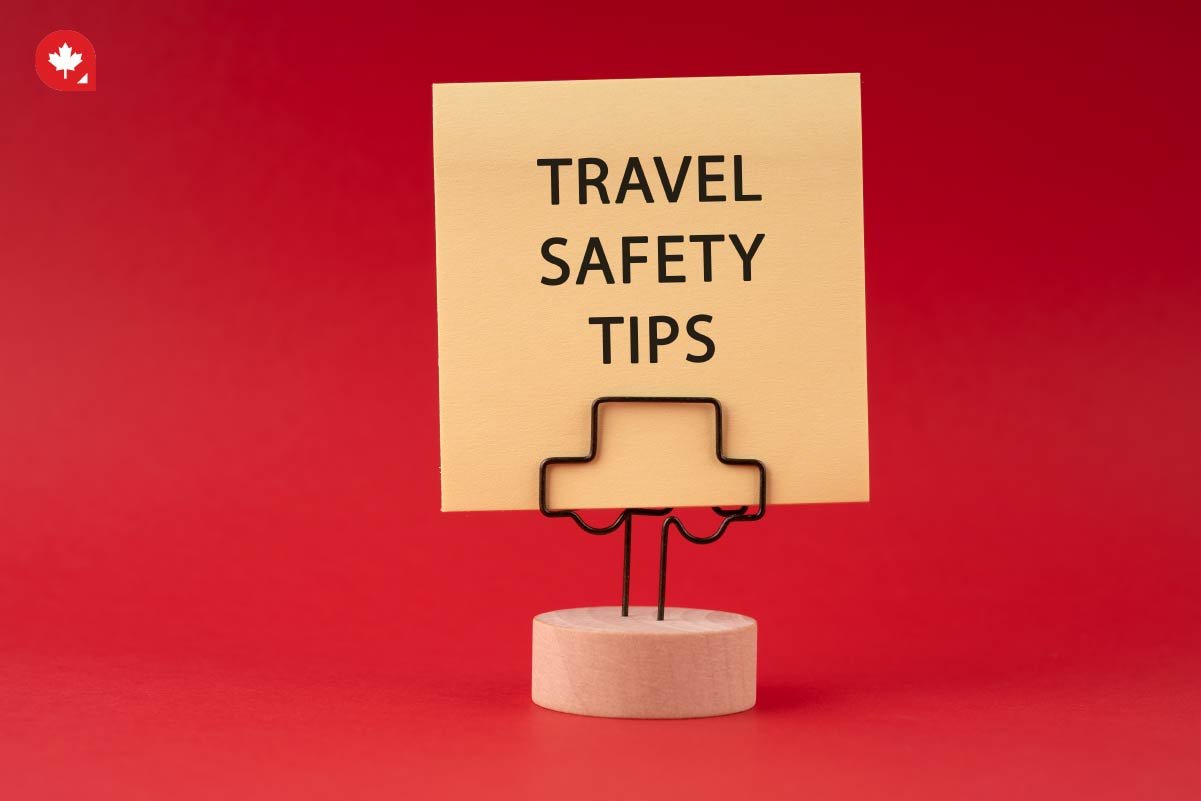As you settle into your new home and explore all it has to offer, Summer is a fantastic time to experience the vibrant life outdoors. However, Canada's summers can bring unique challenges, especially for newcomers. From scorching heat waves to pesky bugs and powerful thunderstorms, it's important to be prepared to stay safe and healthy throughout the season.
This guide provides essential summer safety tips for newcomers to Canada, ensuring you have an enjoyable summer experience.
Learn how to make the most of your first Summer in Canada.
What is Summer Like in Canada?

Summer in Canada is a delightful change from the long winters. The days are long and filled with sunshine, with average highs ranging from a comfortable 20°C (68°F) to a balmy 28°C (82°F). However, the experience can vary depending on where you are in Canada.
Western Canada basks in sunshine, while central Canada can get humid. Atlantic Canada offers a refreshing escape with warm days and cool evenings. No matter the region, summer in Canada calls you outdoors to enjoy the vibrant landscapes, refreshing lakes, and exciting festivals that come alive with the warm weather.
Canadian Provinces with the Hottest Temperatures
Sun seekers, rejoice! If you're looking for the warmest Canadian summers, head west. Western Canada, particularly British Columbia and southern Alberta, boasts the hottest average temperatures during the summer months. This region experiences longer stretches of hot, sunny days, perfect for soaking up the sun.
Central Canada, which includes Ontario and Quebec, offers a different summer experience. Summers here are warm and humid, with occasional heat waves. While still enjoyable for outdoor activities, you'll want to factor in the humidity when planning your days.
Atlantic Canada offers a more moderate summer climate. Summers here are milder with cooler evenings, making them ideal for those who prefer comfortable warmth over scorching heat.
Summer Safety Guide For Newcomers to Canada

Now that you better understand summer weather across Canada let's look into some key safety considerations. You can ensure a safe and healthy season by being prepared for the different aspects of summer weather.
Sun Safety
Sun exposure is a wonderful way to boost your mood and vitamin D levels, but protecting yourself from the sun's harmful rays is crucial. Canada, in particular, has a high UV index throughout the summer months, so taking precautions is essential. Here are some key sun safety tips to keep you healthy and comfortable while enjoying the Summer outdoors.
Sunscreen
Apply sunscreen liberally and evenly to all exposed skin at least 15 minutes before going outside. Choose a broad-spectrum sunscreen with SPF 30 or higher. Don't forget areas like your ears, lips, neck, the tops of your feet, and even the backs of your hands. Reapply sunscreen every two hours and more often if you're sweating or swimming.
Sun-friendly Clothing
Dress strategically! Opt for loose-fitting, long-sleeved shirts and pants made from breathable fabrics like cotton or linen. These fabrics allow air circulation and provide physical protection from the sun's rays, helping you stay cool and comfortable.
Sunglasses
Protect your eyes from harmful UV rays with sunglasses that block UVA and UVB rays. Look for sunglasses that meet the Canadian Standards Association (CSA) standards to ensure they offer adequate protection. Wraparound styles offer additional coverage for the delicate skin around your eyes.
Staying Cool and Hydrated
Summer heat can be invigorating, but it's also important to stay cool and hydrated to avoid heat stroke and other health risks. Here are some key strategies to stay comfortable and safe throughout the warm season.
Hydration
Dehydration is a common yet preventable summer ailment. Make water your go-to beverage and drink plenty throughout the day, even if you don't feel thirsty. Aim to take regular sips rather than gulping down large amounts at once. Avoid sugary drinks and excessive caffeine, as they can dehydrate you further. Opt for water-rich fruits and vegetables like watermelon, cucumber, and celery for an extra hydration boost.
Stay Cool
During the hottest part of the day, typically between 11 am and 3 pm, limit strenuous activity outdoors. If you must be outside, take breaks in shaded areas or air-conditioned spaces like libraries, malls, or community centers. Cooling down your body temperature can be as simple as taking a refreshing shower or bath.
Lightweight Clothing
Dress strategically to beat the heat. Choose loose-fitting, light-colored clothing made from breathable fabrics like cotton or linen. These fabrics allow for better air circulation and will help keep you cooler. Avoid tight-fitting clothing and dark colors, which tend to trap heat.
Water Safety
Canada boasts an abundance of stunning lakes, rivers, and coastlines, making water activities a popular pastime during the summer months. While these water features offer endless opportunities for recreation, it's crucial to prioritize safety when enjoying them. Here are some essential water safety tips to keep in mind.
Swimming Safety
Always swim at lifeguarded beaches or pools, especially if you're new to swimming or lack confidence in your water skills. Regardless of location, never leave children unattended near water, even for a moment. Young children can drown in just a few centimeters of water, so constant supervision is essential. Consider taking basic CPR courses to be prepared in case of an emergency.
Boating Safety
Whether you're cruising on a large boat or paddling a canoe, wearing a lifejacket is mandatory for everyone on board, regardless of swimming ability. Life jackets can save lives in case of unexpected falls or emergencies. Before heading out on the water, check weather conditions and be aware of potential hazards like strong currents, sudden storms, or uneven water depths.
Fire Safety
Summer is a time for enjoying the outdoors, and that often includes campfires and barbecues. However, it's important to remember that fire is a powerful force that must be treated respectfully. Here are some key fire safety tips to ensure a safe and enjoyable summer.
Campfire Safety
Campfires can be a cozy way to spend an evening under the stars, but it's crucial to prioritize safety. Only have campfires in designated fire pits or areas. Always check with local authorities for any burning restrictions or permits required. Before starting a fire, clear away flammable debris like leaves, branches, or dry grass from a wide radius around the pit. Never leave a campfire unattended, not even for a moment. When it's time to extinguish the fire, drown it thoroughly with water, ensuring all embers are cool to the touch.
Barbecue Safety
Barbecues are a staple of summer gatherings but can also pose a fire hazard if not used properly. Always position your barbecue on a stable, level surface away from flammable materials like buildings, fences, or overhanging trees. Inspect the gas line and connections for leaks before each use. Never leave a lit barbecue unattended, and keep a fire extinguisher readily available in case of an emergency. When finished cooking, turn off the gas supply and allow the barbecue to cool completely before cleaning or storing it.
Safety From Insects
Canada's diverse landscapes provide a haven for a variety of insects, some of which can be a nuisance or even pose health risks. While encountering these creatures is inevitable when spending time outdoors, there are steps you can take to minimize bites and stings and protect yourself from insect-borne illnesses.
Insect Repellent
Your first line of defense against pesky insects is a good quality insect repellent. Health Canada recommends using repellents containing DEET as an effective way to deter mosquitoes and ticks. However, it's important to follow the guidelines on the product label for safe and appropriate application. Be mindful of the concentration of DEET, especially when using repellent on children. Consider natural alternatives like citronella oil or picaridin for those seeking a DEET-free option, although these may require more frequent reapplication.
Long Clothing
While you might be tempted to wear shorts and tank tops in the summer heat, opting for long pants and long-sleeved shirts can significantly reduce your chances of insect bites. Choose lightweight, breathable fabrics like cotton or linen to stay cool while remaining protected. Tuck your pants into your socks for added protection against ticks, which are particularly prevalent in tall grasses and wooded areas.
Insect Checks
After spending time outdoors, especially in areas with high insect activity, perform a thorough body check for ticks and other insects. Pay close attention to areas like your armpits, behind your knees, and the back of your head. If you find a tick attached to your skin, remove it carefully using a pair of fine-tipped tweezers.
Wildlife Safety
Canada's vast wilderness teems with a variety of wildlife, from majestic bears and playful moose to curious raccoons and songbirds. Encountering these creatures in their natural habitat can be a thrilling experience, but it's vital to prioritize safety for both yourself and the animals. Here's how to ensure a respectful and safe coexistence with wildlife this summer.
Be Bear Aware
If you live in an area with bears, black bears, or grizzly bears, depending on the region, it's crucial to be informed about safe practices to avoid unwanted encounters. Familiarize yourself with bear behavior and signs of their presence in your area. Parks and wildlife agencies often offer educational resources and workshops on bear safety.
Consider carrying bear spray as a deterrent in a close encounter. Parks Canada warns that using bear spray should only be considered as a last resort and urges everyone to avoid a bear encounter in the first place.
You must always know how to use bear spray properly and practice safe handling techniques to avoid accidental discharge.
Wildlife Encounters
While it's tempting to get close to wild animals for a photo opportunity or a better look, it's important to admire them from a safe distance. Wild animals, regardless of how cute or docile they may appear, can be unpredictable and have powerful instincts. Never approach, feed, or attempt to touch wild animals. Feeding wildlife disrupts their natural foraging patterns and can make them aggressive towards humans.
If you encounter an animal on a trail, remain calm and slowly back away, allowing them the space to move on. Report any aggressive animal behavior to the appropriate wildlife authorities.
By following these safety tips, you can minimize the risk of negative interactions with wildlife and ensure a harmonious summer experience for you and the animals.
Thunderstorm Safety
Canada's summer months can bring dramatic changes in weather, with occasional thunderstorms rolling through. While these storms can provide a refreshing break from the heat, they also pack a powerful punch. Here's what you need to know to stay safe during a thunderstorm.
Seek Shelter Immediately
Hearing thunder is your cue to seek safe shelter right away. The old saying "When you see lightning, count to ten; if you hear thunder before ten, then the storm is close enough to strike" still holds true. Find a sturdy building away from windows and doors. Basements are ideal as they provide the most protection.
If you're caught outdoors with no building in sight, avoid taking shelter under tall trees, open gazebos, or in open fields. These structures offer little protection from lightning strikes. The safest option is to crouch low to the ground, making yourself as small a target as possible. Avoid lying flat on the ground or leaning against anything conductive, like a metal fence.
Stay Off Electronics
During a thunderstorm, it's best to minimize your use of electronic devices, including cell phones and laptops. While the risk of a lightning strike directly hitting a handheld device is relatively low, the electrical current can travel through electrical wires and phone lines, potentially causing injury. Avoid using corded landline phones during a storm for the same reason.
Additional Summer Safety Tips

Being prepared goes a long way in ensuring a safe and enjoyable summer. Here are some additional tips to keep in mind.
Learn to Swim
If you're new to Canada or haven't yet learned how to swim, consider taking lessons. Many communities offer swimming programs for adults and children, providing valuable skills for enjoying water activities safely. Even if you plan to stick to shallow areas, knowing how to swim can give you peace of mind and allow you to participate in a wider range of water-based fun.
Get a First-Aid Kit
Accidents happen, even with the best precautions. Keep a well-stocked first-aid kit readily available at home and when venturing outdoors. Your kit should include essential supplies like bandages, antiseptic wipes, pain relievers, and insect bite treatment.
Weather Updates
Stay informed about current and forecasted weather conditions, especially if you're planning outdoor activities. Environment Canada, the national weather service, provides detailed weather forecasts, warnings, and advisories. Checking the forecast before heading out can help you dress appropriately and plan your activities around any potential weather hazards like heat waves or thunderstorms.
By following these summer safety tips and staying informed, you can make the most of the warm season in Canada. With a little preparation and awareness, you can create lasting summer memories while keeping yourself and your loved ones safe.
Emergency Numbers You Must Know as a Newcomer to Canada
In an emergency situation, knowing the right number to call can be critical. Here are the essential emergency numbers you should remember in Canada.
Emergency Services
Dial 911 for fire, police, or medical emergencies. This is the universal emergency number across Canada. When you call 911, a dispatcher will answer and ask you which service you require. Stay calm and provide the dispatcher with clear and concise information about the nature of your emergency and your location.
Poison Control
If you or someone you know has been poisoned, call the Canadian Poison Control Centre at 1-800-561-3333. This hotline is available 24/7 and provides free, confidential medical advice for poisoning emergencies.
Remember, being safe than sorry is always better. In any situation where you feel unsure or require immediate assistance, don't hesitate to dial 911.
FAQs
I Want to Immigrate to Canada by Next Summer. What is the Fastest Way to do so?
If you are a skilled worker, you can apply to Canada's Express Entry System. Processing for this pathway takes just six months.
I Want to Work in Canada this Summer as a Seasonal Worker. How Can I Make Sure My Work Environment Will be Safe?
Ensure you have the proper Canadian work permit and understand your rights as a worker in Canada. This includes minimum wage, overtime pay, and health and safety regulations. Resources like the Employment and Social Development Canada website can provide valuable information.




